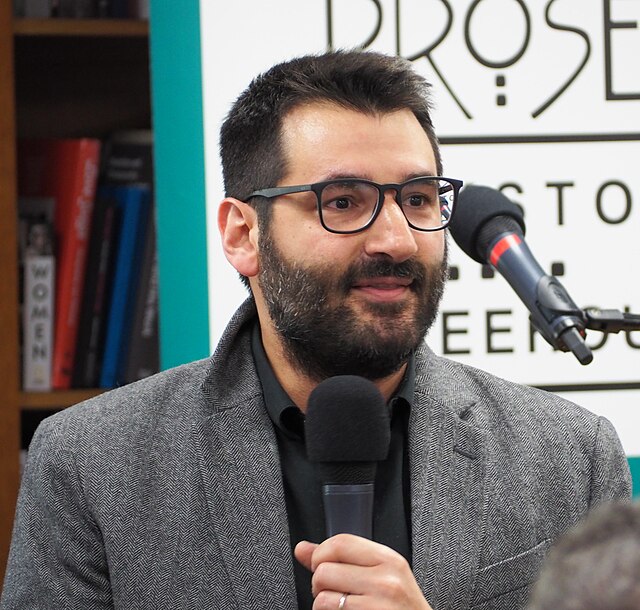Dearborn Stories Review: The Tic-Tac Toe Game of Displaced and Found

By Teresa Fidalgoazize/ Arab America Contributing Writer
After the attacks of 9/11, Uncle Sam had begun decorating his house with patriotic
and athletic symbols even though he didn’t care for baseball or football. He only knew
Americans were obsessed with their sports teams. He also changed his name from Samir to Sam.
Ghassan Zeineddine, The Actors of Dearborn
Displaying patriotism signals the degree to which becoming an American beyond citizenship is a negotiation between assimilation and heritage preservation/pride for many immigrants to protect themselves from the unwanted insignia of foreigners. Dearborn, Michigan is an Arab-majority city in the US whose mayor is both Muslim and Arab, Abdullah H. Hammoud. Motivation to migrate from Lebanon, Syria and Yemen —civil wars, US military invasions and internal conflicts—to non-urban Dearborn lies in how the city provided economic opportunity to migrants from the 1920s to recently because of its proximity to Detroit’s General Motors- a flourishing auto industry. With a 110,000 population of people of Middle Eastern or North African descent, Dearborn offers a microcosm of the Arab American experience in the United States- one which showcases resilience, community, and economic mobility but also identity markers and crisis compromises.
After the October 7th, 2023 terrorist attack on Israel led by Hamas, ignorance has resurfaced on the subjects of Islamophobia and anti-immigrant sentiment, correlating extremism with ethnicity and religion. The dissemination of malign ignorance has found legitimacy in prominent and respected media companies and newspapers such as The Wallstreet Journal and The New York Times. However, unlike the silence endured after the 9/11 attack —a wave of institutional racial discrimination and profiling — Dearborn residents no longer remain in the shadows amidst injustices be it in the United States or in their faraway homeland in Gaza. The collection of ten short stories, Dearborn Stories by Ghassan Zeineiddine published last year, 2023, expresses with satire and also humor and joy how Dearborn is a place that encapsulates both loss and belonging for recently arrived immigrants and first/second generation Arabs.
Identity Spectrum: How American Are We?
Zeineddine: Among Arab Americans, you may experience the feeling of being an outsider in either community, Arab or American, and you’re kind of always caught in the middle of that. There’s always this push and pull of how much of your identity that you can reveal.
Staking Ground in Multiple Lands: A Conversation with Ghassan Zeineddine
In the story Money Chickens, the son of Lebanese refugees grew up hearing his parents mention how their economic prosperity in America influenced them to return to the country they escaped from. The spare money they made working part-time jobs was hidden inside chickens which when then frozen to evade reporting to the IRS. Exploring the generational change in the appreciation of the homeland, and the difference between Lebanese and Lebanese Americans, Zeineddine leads the reader into the plot crux of this story: what do success and identity signify when chasing a dream that requires criminal activity? For the narrator of this story to become a successful businessman he understood he had to commit fraud- at first, he partook in such activities for financial stability but they later evolved into insatiable greed. Zeineddine presents us with a rags-to-riches Arab-American gangster – removed from the old-world values of honor and honesty for that of image and prestige.
We were stuck in a time warp – our parents, most of our friends’ parents, had brought their customs and traditions from Southern Lebanon across the sea and ocean to Dearborn. I understood what Daya was saying. But this is the only life I knew. I had never traveled outside of Michigan
Ghassan Zeineddine, Money Chickens
Alluding to the quote above, when the narrator speaks on how he has not seen life outside Dearborn, Lebanon is not a home country for him. The Arab American identity crisis surfaces making us question which identity we uphold guarantees survival and the promise of fulfillment. Analogous to how the land of heritage is bruised with ongoing conflict, America, the land of opportunity, pivots the moral compass of those who live in it. A tumultuous negotiation occurs asking the citizens how much do they leave behind for the comfort of the American dream.
Throughout Dearborn’s ten stories which depict conversations of sexuality, gender identity, religious fervor, and national/ethnic identification, the author Zeineddine welcomes the gray zone of lack of coherence, and clarity, and answers a metaphoric connection to the in-betweenness of being both Arab and American. Dearborn’s most significant contribution is its avoidance of solely presenting a model citizen picture of the Arab-American experience for one that is uncomfortably truthful and messy.
Works Cited
Hellman , Melissa. “‘Unlike 9/11, We’re Fighting Back’: Arab Americans in Dearborn Are Resilient in the Face of Islamophobia.” The Guardian, Guardian News and Media, 11 Feb. 2024, www.theguardian.com/us-news/2024/feb/11/unlike-911-were-fighting-back.
Hernandez, Dorothy. “Dearborn, Michigan: A Visit To The First Arab-Majority City in the US.” BBC News, BBC, 29 Apr. 2024, www.bbc.com/travel/article/20240429-dearborn-michigan-a-visit-to-the-first-arab-majority-city-in-the-us.
Truong, Brian. “Staking Ground in Multiple Lands: A Conversation with Ghassan Zeineddine.” The Rumpus, 16 Oct. 2023, therumpus.net/2023/10/09/ghassan-zeineddine/.
Zeineddine , Ghassan. Dearborn Stories . Tin House , 2023.
Check out the Arab America blog here!









